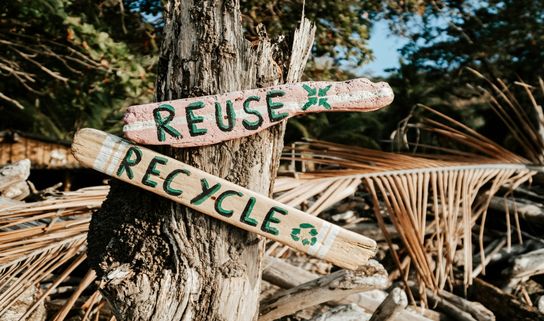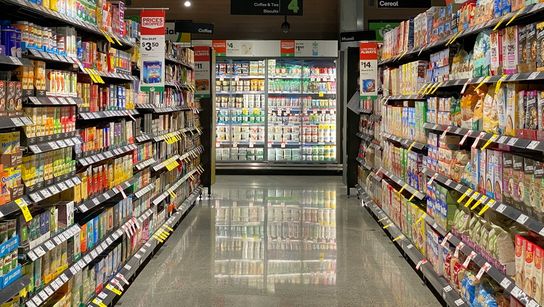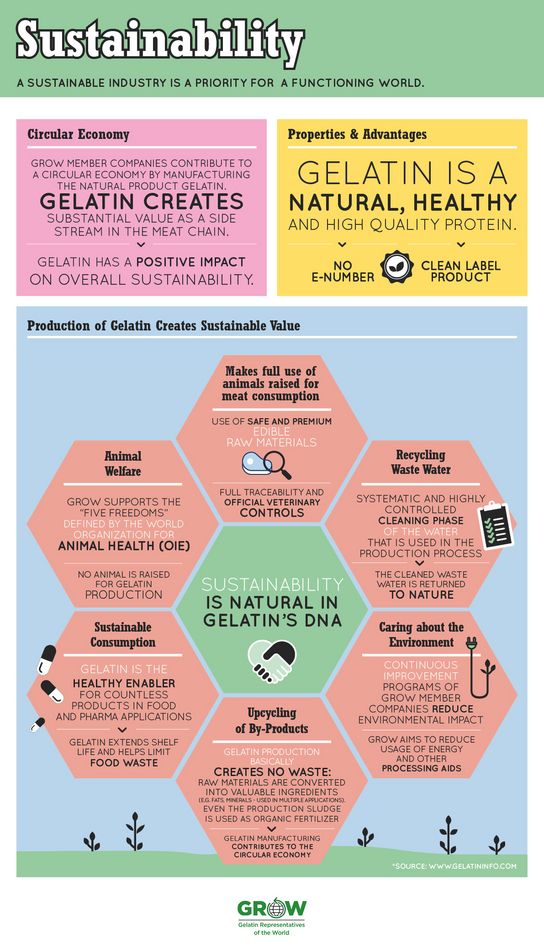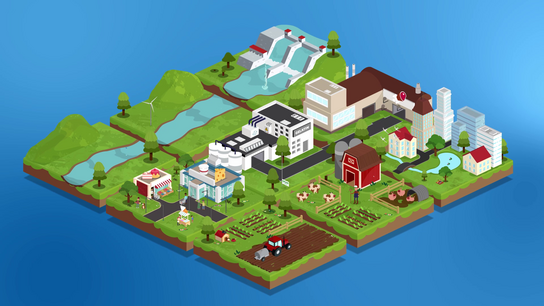Committed to sustainability
Gelatin and collagen peptides are natural products that offer sustainable added value across the entire production chain and are part of the circular economy. GROW has taken social responsibility to heart by supporting all reasonable measures to improve sustainability.
Sustainability
A growing number of consumers want to know what our foods and other products that are used daily are made from. There is no cause for concern in the case of gelatin and collagen peptides: they are a pure, natural protein made from animal raw materials and contain neither preservatives nor other additives. They are thus a natural and healthy foodstuff with a clean label that optimally meets consumer needs in terms of application and sustainability. A growing number of consumers also want to be able to understand what kind of impact a certain product has on the environment. All sectors of the manufacturing industry must therefore continuously assess their processes to ensure that they have as little impact on the environment as possible.
Production: Ecologically correct
Gearing production processes towards sustainability is crucial to the success of gelatin manufacturers, both ecologically as well as economically. The raw materials used to make gelatin and collagen peptides are 100 per cent natural and depend upon a healthy and intact environment. For this reason, manufacturers and producers are very interested in long-term environmental protection.
Sustainability already begins with the fact that gelatin and collagen peptides are made with the by-products of the meat processing industry. Thus, giving added value for millions of farmers.

Putting valuable by-products to good use
The by-products from the production and refining processes of gelatin and collagen peptides undergo further processing. This makes good economic sense considering the volume of the by-products is about two times the volume of the gelatin and collagen peptides products. The by-products can be divided into three groups. The high-quality proteins, for example, are used as ingredients for pet food to enhance its nutritional value.
The especially high purity fats are used as a raw material in oleo chemistry industry or for biodiesel production, which in turn helps reduce CO2 emissions. The minerals are added to fertilizers, transformed into anti-corrosive agents or used to protect casting molds in steel construction. It is almost impossible to put residues to better use.
Recycling potential
Fresh, clean water is also an important resource that should not be wasted. The wastewater that is generated during the gelatin manufacturing process is returned to nature – often cleaner than it was before. In order to achieve this, the wastewater is pre-cleaned to remove any recyclable materials before being discharged to wastewater treatment plants.
In some cases, special bacteria break down components such as protein and other organic materials, converting them into methane.
This creates biogas, a valuable product that is then used in cogeneration units where it is used to produce electricity and heat. Several companies run their own energy centers, thereby generating a large portion of the energy they need. The waste heat this produces is not simply emitted but used for drying processes. Good use is also made of the sludge: all residual solid waste is filtered out and used in agriculture as lime sludge, an organic fertilizer that is full of nutrients and contributes to an environmentally friendly agricultural sector and helps it break away from fossil fertilizers.

Sustainable on the retail side as well
Outside of the production process, gelatin also helps reduce food waste on the retail side of the supply chain: it extends the shelf life of various foods such as fresh sausage or meat products by acting as barrier to oxygen.
All of this works towards one goal: a sensible use of limited resources in times of growing population.
Circular economy
Gelatin and collagen peptides raw material sources are by-products from the meat and farmed fish processing industries, generally considered as well-managed, natural and renewable resources.
Within the complete value chain of the meat and fish processing industries, the gelatin and collagen peptides production creates value for the community at large by converting by-products into higher value protein products, greases and minerals, thus reducing the environmental impact and enhancing the social and economic dimension of the meat and fish industries. As such, gelatin can be considered as a product with a positive impact on overall sustainability and being part of the circular economy.
Unlocking Upcycling Potential in Food Production - Expert Roundtable
Find out more about the upcycling potential in the food industry and why gelatin is an upcycling champion. In our roundtable event, experts discuss the importance of the transformation of the industry from chain to circle. Read more on our blog and watch the full recording.


